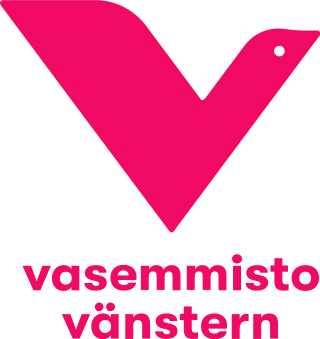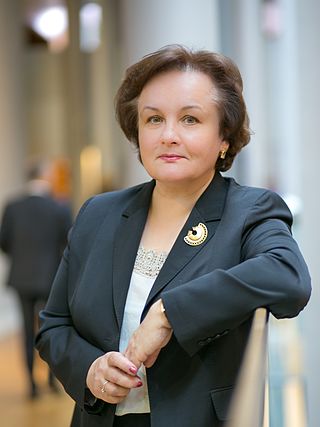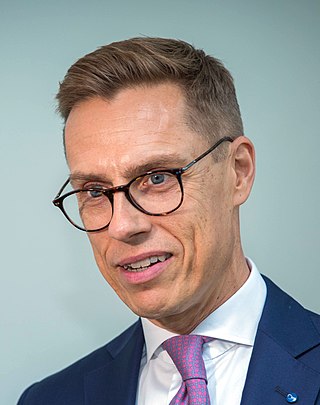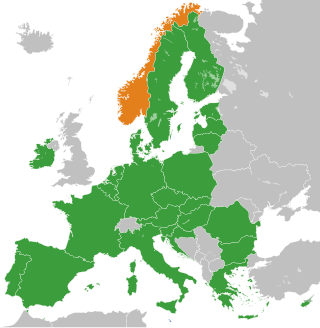Notes
- European Parliament (2014). "European Parliament / Results of the 2014 European elections". European Parliament. Retrieved 2016-07-25.
- 1 2 "Laima Andrikienė tapo Europos Parlamento nare". 15min.lt. 2016-06-06. Retrieved 2018-07-14.
| Members of the European Parliament for Lithuania | |
|---|---|
| Observers | (2003) |
| Delegation | (2004) |
| 6th term | (2004) |
| 7th term | (2009) |
| 8th term | (2014) |
| 9th term | (2019) |
This is a list of the 11 members of the European Parliament for Lithuania in the 2014 to 2019 session.
| Name | National party | EP Group |
|---|---|---|
| Petras Auštrevičius | Liberal Movement | ALDE |
| Zigmantas Balčytis | Social Democratic Party | S&D |
| Vilija Blinkevičiūtė | Social Democratic Party | S&D |
| Antanas Guoga | Liberal Movement (until 9 October 2016) Independent | ALDE (until 4 October 2016) |
| Valentinas Mazuronis | Order and Justice (until 30 June 2015) Labour Party (until 6 November 2017) Independent | EFDD (until 15 October 2014) Non-Inscrits (until 19 October 2014) EFDD (until 18 May 2015) |
| Rolandas Paksas | Order and Justice | EFDD (until 15 October 2014) Non-Inscrits (until 19 October 2014) EFDD (until 18 May 2015) |
| Bronis Ropė | Lithuanian Farmers and Greens Union | G-EFA |
| Gabrielius Landsbergis (until 12 May 2016) [1] Laima Andrikienė (from 30 May 2016) [1] | Homeland Union – Lithuanian Christian Democrats | EPP |
| Algirdas Saudargas | Homeland Union – Lithuanian Christian Democrats | EPP |
| Valdemar Tomaševski | Electoral Action of Poles | ECR |
| Viktor Uspaskich | Labour Party | ALDE |
Albania is a unitary parliamentary constitutional republic, where the President of Albania is the head of state and the Prime Minister of Albania the head of government in a multi-party system. The executive power is exercised by the Government and the Prime Minister with its Cabinet. Legislative power is vested in the Parliament of Albania. The judiciary is independent of the executive and the legislature. The political system of Albania is laid out in the 1998 constitution. The Parliament adopted the current constitution on 28 November 1998. Historically Albania has had many constitutions. Initially constituted as a monarchy in 1913, Albania became briefly a republic in 1925, and then a authoritarian monarchy in 1928. In 1939 Albania was invaded by Fascist Italian forces, imposing a puppet state, and later occupied by Nazi German forces. Following the partisan liberation from the Nazis in 1944 a provisional government was formed, which by 1946 had transformed into a Communist one-party state. In March 1991 democracy was restored with multi-party elections.

The Left Alliance is a socialist political party in Finland.

Laima Liucija Andrikienė is a Lithuanian politician serving as member of the European Court of Auditors since November 2022.

Cai-Göran Alexander Stubb is a Finnish politician who served as Prime Minister of Finland from 2014 to 2015. He rose to politics as a researcher specialized in the affairs of the European Union and was elected to the European Parliament in 2004 as a member of the National Coalition Party. In 2008, Stubb was appointed as Minister for Foreign Affairs following a scandal surrounding his predecessor, Ilkka Kanerva. In 2011 Stubb stood for election to the Finnish Parliament for the first time and was elected MP with the second highest vote count in the election, which led to Stubb becoming the Minister for Europe and Foreign Trade in Jyrki Katainen's cabinet.

The Parliamentary Assembly of the Council of Europe (PACE) is the parliamentary arm of the Council of Europe, a 46-nation international organisation dedicated to upholding human rights, democracy and the rule of law.

Norway is not a member state of the European Union (EU). However, it is associated with the Union through its membership of the European Economic Area (EEA), signed in 1992 and established in 1994. Norway was a founding member of the European Free Trade Association (EFTA) in 1960, which was originally set up as an alternative to the European Economic Community (EEC), the main predecessor of the EU. Norway had considered joining both the EEC and the European Union, but opted to decline following referendums in 1972 and 1994. According to the European Social Survey conducted in 2018, 73.6% of Norwegians would vote 'No' in a referendum to join the European Union. Norway has two land borders with EU member states: Finland and Sweden.

The Jobbik – Conservatives, commonly known as Jobbik, is a conservative political party in Hungary.

The Republic of Artsakh is a republic with limited recognition in the South Caucasus region. The Republic of Artsakh controls most of the territory of the former Nagorno-Karabakh Autonomous Oblast. It is recognized only by three other non-UN member states, Abkhazia, South Ossetia and Transnistria. The rest of the international community recognizes Artsakh as part of Azerbaijan. In November 2012, a member of Uruguay's foreign relations committee stated that his country could recognize Nagorno-Karabakh's independence. In 2012, Armenia and Tuvalu established diplomatic relations and it was expected that Tuvalu may recognize Artsakh's independence. In October 2012, the Australian state of New South Wales recognized Nagorno-Karabakh. In September 2014, the Basque Parliament in Spain adopted a motion supporting Artsakh's right to self-determination and in November 2014, the Parliament of Navarre, also in Spain, issued a statement supporting Artsakh's inclusion in taking part in settlement negotiations.
The European Conservative Group was a conservative political group in the European Parliament between 1973 and 1979.

Morten Messerschmidt is a Danish politician and since 2022 leader of the Danish People's Party. He was an elected Member of the Folketing at the 2019 Danish general election having previously served from 2005 to 2009. At the 2014 European Parliament election, he was elected a Member of the European Parliament for Denmark with 465,758; the highest number of personal votes ever cast at a Danish election.

Isabella Lövin is a Swedish politician for the Green Party. She served as Minister for International Development Cooperation from 2014 to 2019, as Minister for the Environment from 2019 to 2021 and as honorary Deputy Prime Minister of Sweden from 2016 to 2021. She led the Green Party as co-spokesperson from 2016 to 2021, sharing the task with Gustav Fridolin (2014-2019) and Per Bolund (2019-2021).

Petra Kammerevert is a German politician who has been serving as Member of the European Parliament (MEP) since 2009. She is a member of the Social Democratic Party of Germany, part of the Party of European Socialists.

Jens Geier is a German politician who has been serving as a member of the European Parliament since 2009. He is a member of the Social Democratic Party of Germany, part of the Party of European Socialists.

Visitors to Dominica normally do not require a visa unless they are nationals of the Dominican Republic or Haiti.

The Single Resolution Mechanism (SRM) is one of the pillars of the European Union's banking union. The Single Resolution Mechanism entered into force on 19 August 2014 and is directly responsible for the resolution of the entities and groups directly supervised by the European Central Bank as well as other cross-border groups. The centralised decision making is built around the Single Resolution Board (SRB) consisting of a Chair, a Vice Chair, four permanent members, and the relevant national resolution authorities.

Siegfried Mureșan is a Romanian economist and politician, vice-president of the European People's Party (EPP) since November 2019, vice-president of the European People's Party Group in the European Parliament and member of the National Liberal Party (PNL). He was elected as Member of the European Parliament (MEP) from Romania in 2014 and 2019. Previously, he was a member of the People's Movement Party (PMP) between 2014 and 2018 and the Democratic Liberal Party (PDL) before 2014.

The accession of Moldova to the European Union (EU) is on the current agenda for future enlargement of the EU.

The 2024 European Parliament election is scheduled to be held on 6 to 9 June 2024. This will be the tenth parliamentary election since the first direct elections in 1979, and the first European Parliament election after Brexit.